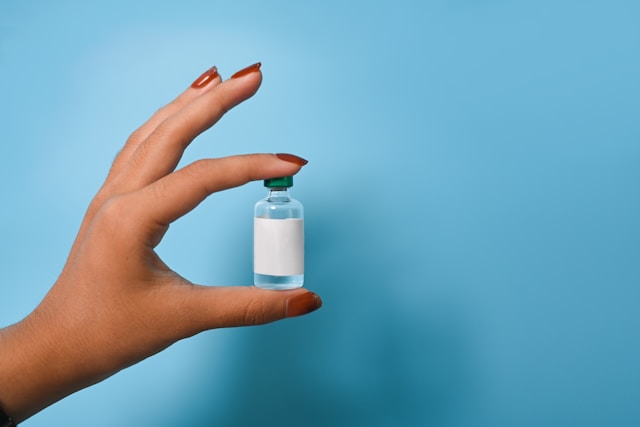[Disclaimer: This article is for informational purposes only and does not constitute medical advice. Always consult with a qualified healthcare provider before considering any peptide therapy.]
Thymosin Alpha-1 (TA1) is one of the most thoroughly researched immune-supporting peptides available today. This naturally occurring compound has been used in medical settings for over three decades. Thousands of patients have demonstrated its safety and effectiveness for immune system support.
What makes TA1 particularly interesting? It works with your body’s natural defenses rather than against them.
The peptide doesn’t suppress or overstimulate. Instead, it helps balance and optimize immune function through multiple pathways.
For anyone dealing with chronic infections, weakened immunity, or looking to support their body’s natural defense mechanisms, understanding how thymosin alpha-1 works can open new possibilities for health optimization.
Quick Takeaways
- Thymosin alpha-1 is a naturally occurring peptide that balances and strengthens your immune system without overstimulating it.
- Clinical studies show it helps treat viral infections like hepatitis, supports cancer therapy, and reduces infection frequency with minimal side effects.
- Standard dosing is 1.6 mg injected under the skin twice weekly for 3-24 months depending on your condition.
- Over 3,000 patients have used TA1 safely in clinical trials, making it one of the most well-researched immune-supporting peptides available.
What is Thymosin Alpha-1 Peptide?
Thymosin Alpha-1 is a small peptide made up of 28 amino acids. Your thymus gland produces it naturally. This gland sits in your chest and trains immune cells to recognize and fight threats.
Scientists first isolated TA1 from calf thymus in 1977. They later developed a synthetic version called thymalfasin (brand name Zadaxin). Today, more than 35 countries approve it for treating hepatitis B and C and boosting immune responses[1].
The peptide has some interesting properties. It’s highly acidic and flexible in structure. This flexibility is actually a benefit—it allows TA1 to interact with multiple immune system receptors and adapt based on what your body needs[2].
Here’s what makes TA1 different from many drugs: it mimics what your body already produces. Your thymus gland naturally secretes this peptide to regulate immune cells. The synthetic version simply complements your natural biology rather than introducing something foreign.
How Thymosin Alpha-1 Works
Thymosin Alpha 1 operates through several connected pathways that work together to strengthen your body’s defenses.
Toll-Like Receptor Activation
TA1 primarily works by activating proteins called Toll-like receptors (TLRs). Think of these as your immune system’s alarm system.
When TA1 binds to these receptors on immune cells, it triggers multiple signaling pathways that prepare your body to identify and respond to threats. Immune cells become more alert, responsive, and coordinated in their defense efforts[2].
This happens through several pathways:
- The NF-κB pathway activates, ramping up immune responses
- Interferon production increases, helping fight viruses
- Cytokines get released, coordinating immune cell activity
Third-Party Tested, 99% Purity
Order lab-verified peptides from our top recommended vendor.

Enhanced Immune Function
Beyond activating alarm systems, TA1 directly improves the cells that make up your immune defenses.
T-Cells Get Stronger
T-cells are essential for identifying and destroying infected or abnormal cells. They respond particularly well to TA1 treatment.
The peptide helps T-cells mature and work better. It boosts both helper T-cells (CD4+) and killer T-cells (CD8+) while keeping them balanced. It also stimulates production of substances that coordinate immune responses against viruses and cancer cells[1].
Natural Killer Cells Become More Effective
Natural killer (NK) cells patrol your body looking for infected or cancerous cells. TA1 makes these cells better at their job and helps them recover faster after illness or stress.
Scout Cells Improve Their Detection
Dendritic cells act as scouts for your immune system. They capture threats and alert other immune cells. When exposed to TA1, these cells become more effective at detecting and reporting dangers throughout your body[3].
Benefits of Thymosin Alpha-1
The clinical evidence supporting TA1’s effectiveness spans multiple health conditions. Research shows particularly strong results in viral infections and immune system disorders.
Viral Infection Support
Hepatitis B and C Treatment
Clinical trials show impressive results for chronic hepatitis B patients. Those receiving 1.6 mg of TA1 twice weekly achieve complete viral clearance rates of 40.6%[4]. That’s significantly higher than many standard treatments used alone.
The peptide also reduces the risk of developing liver cancer and improves liver function markers.
For hepatitis C, TA1 works best when combined with other treatments. While it doesn’t work well alone, adding it to pegylated interferon-α2a shows sustained viral response rates of 41.0% compared to 26.3% with interferon by itself[3].
COVID-19 and Respiratory Infections
Studies on TA1’s role in COVID-19 treatment show mixed results. Early administration may reduce how long the virus stays in your system and improve clearance.
The peptide appears most effective in patients with severely low lymphocyte counts[5]. More research is needed to establish clear treatment protocols.
Clinical Benefits by Condition
| Condition | How TA1 Helps | Key Results |
|---|---|---|
| Sepsis | Reduces organ failure and death | 9% lower mortality vs. standard care |
| Cancer Treatment | Reduces chemo side effects, supports immune function | Better treatment tolerance, maintained immune surveillance |
| Vaccine Response | Boosts antibody production | Improved response in elderly and immunocompromised patients |
| Chronic Infections | Strengthens ongoing immune defense | Faster recovery, reduced infection frequency |
| Age-Related Decline | Restores thymus function | Improved immune cell counts and function |
Additional Health Benefits
TA1 offers several other advantages beyond its primary immune functions.
It reduces inflammatory molecules like TNF-α and IL-1β while promoting immune balance. This helps manage chronic inflammation without shutting down necessary immune responses.
The peptide also boosts antioxidant enzymes like superoxide dismutase and glutathione peroxidase[1]. These provide extra cellular protection against oxidative stress.
Some research even suggests benefits for wound healing. TA1 appears to speed up skin cell movement and collagen production.
Similar to thymosin alpha-1, thymalin peptide also supports immune function through thymus-derived mechanisms, though through slightly different pathways.
Thymosin Alpha-1 Dosage and Administration
Proper dosing and administration technique directly impact treatment effectiveness and safety. Getting these details right makes the difference between optimal results and wasted effort.
Standard Dosing Protocols
The most common protocol involves 1.6 mg administered subcutaneously twice weekly for 6-24 months. Duration depends on your specific condition and goals.
For individuals weighing under 40 kg (88 pounds), dosing adjusts to 40 mcg/kg twice weekly. This maintains appropriate blood levels.
Dosing by Condition
| Condition Type | Dose | Frequency | Duration |
|---|---|---|---|
| Acute Infections | 1.6 mg | Twice daily | 5-7 days |
| Chronic Conditions | 1.6 mg | Twice weekly | 3-12 months |
| Cancer Support | 1.0-1.5 mg | 2-3 times weekly | During treatment cycles |
| General Immune Support | 1.6 mg | Twice weekly | 6-24 months |
| Under 40 kg body weight | 40 mcg/kg | Twice weekly | As needed |
For detailed guidance on calculating your specific dose, our thymosin alpha-1 dosage calculator provides personalized recommendations based on weight and condition.
How to Administer TA1
Route matters when using thymosin alpha-1. Subcutaneous injection using a 29-31 gauge needle ensures proper absorption and minimizes discomfort.
Rotate between injection sites to prevent tissue irritation:
- Abdomen (most common)
- Thigh
- Flank (side)
Rotating sites maintains consistent absorption and prevents scar tissue buildup.
Storage Requirements
Storage requires attention to detail. Reconstituted peptide remains stable for up to 30 days when refrigerated between 2-8°C (36-46°F).
Avoid freeze-thaw cycles, which degrade the peptide and reduce effectiveness. Once mixed, keep vials away from direct light and excessive heat.
Timing Your Doses
Timing consistency matters more than the specific time of day. Whether you choose morning or evening administration, maintaining a regular schedule helps optimize results and makes the routine easier to follow.
If you’re new to peptide injections, understanding where to inject peptides safely can help you avoid common mistakes and maximize comfort.
Understanding How the Body Processes TA1
TA1 reaches peak concentration within 1-2 hours following injection[6].
Its half-life is approximately 2-3 hours. This relatively short duration explains why twice-weekly dosing often works better than less frequent administration.
Your body processes each dose completely before the next injection. No accumulation occurs with repeated dosing, which means each injection starts fresh.
💡PEPTIDE PICKS: MORE TO EXPLORE
- Curious about other thymus-derived immune peptides? Discover how thymalin peptide supports longevity and immune health through complementary mechanisms.
- Want a broader view of immune-supporting compounds? Check out our comprehensive guide to anti-aging peptides that boost health and longevity.
- Looking to calculate your exact dose? Use our thymosin alpha-1 dosage calculator for personalized recommendations based on your weight and goals.
Safety Profile and Common Side Effects
One of TA1’s most compelling features is its excellent safety record. More than 3,000 individuals across various clinical trials have used this peptide.
No clinically significant adverse reactions directly caused by TA1 have been reported in extensive clinical experience.
What to Expect: Minimal Side Effects
Most people tolerate TA1 remarkably well. When side effects do occur, they’re typically mild and temporary.
| Side Effect Type | Frequency | Description |
|---|---|---|
| Injection Site Reactions | Common | Mild redness, swelling, or discomfort that resolves within hours to a day |
| Fatigue | Occasional | Transient tiredness, especially during first few injections |
| Flu-like Symptoms | Occasional | Mild symptoms as immune system responds to enhanced activity |
| Headache | Rare | Mild and temporary |
| GI Discomfort | Rare | Mild stomach upset |
| Muscle Atrophy at Site | Very Rare | Temporary muscle changes at injection location |
| Joint Pain with Swelling | Very Rare | Polyarthralgia combined with hand edema |
| Allergic Reactions | Very Rare | Only in individuals with peptide sensitivities |
Lab monitoring occasionally shows a temporary increase in ALT (liver enzyme) to more than twice baseline during therapy. This generally doesn’t require stopping treatment unless signs of liver problems appear, which is extremely uncommon.
Who Should Avoid TA1?
While generally considered safe, certain individuals should exercise caution or avoid TA1 altogether.
Do Not Use If:
- You have hypersensitivity to thymosin alpha-1 or any injection components
- You’ve had allergic reactions to similar peptides
- You’re an organ transplant recipient (unless benefits clearly outweigh risks)
Use with Caution If:
- You’re pregnant (use only if benefits clearly outweigh risks)
- You’re breastfeeding (unknown if it passes into breast milk)
- You’re under 18 years old (safety not established)
- You have an autoimmune condition (requires close medical supervision)
Pregnant women should note that TA1 is Category C. Animal studies showed no fetal problems, but human data remains limited.
Patients with autoimmune conditions need special consideration. While TA1 can modulate immune responses, some autoimmune conditions might actually benefit from immune rebalancing when properly supervised.
Thymosin Alpha-1 for Autoimmune Conditions
The relationship between TA1 and autoimmune disease needs careful consideration. Since autoimmune conditions involve the immune system attacking your own tissues, any immune-modulating treatment requires caution.
In theory, boosting immune function could worsen conditions like rheumatoid arthritis or lupus. But the reality appears more nuanced.
Research suggests TA1 may help restore immune balance rather than simply boost immunity. The peptide appears to promote proper immune regulation. This could actually benefit some individuals with autoimmune conditions by reducing inappropriate immune responses while maintaining protective immunity.
Some doctors use TA1 in patients with chronic infections who also have autoimmune diseases. They carefully monitor for any disease flare-ups.
The Key Considerations:
- Proper patient selection is critical
- Close medical supervision is required
- Benefits must clearly outweigh risks
- Regular monitoring for disease activity changes
Individuals with autoimmune conditions should never use thymosin alpha-1 without consulting healthcare providers experienced in both peptide therapy and autoimmune disease management.
Drug Interactions and Treatment Compatibility
TA1 shows minimal drug interaction potential, making it relatively easy to add to existing treatment plans:
- No reported drug-drug interactions in clinical studies
- Compatible with antiretroviral therapy in HIV patients
- Can be used with conventional hepatitis treatments
- Works alongside most infection treatments
Important Rules:
- Never mix TA1 with other drugs in the same injection
- Always administer peptides separately
- This ensures proper dosing and minimizes contamination risk
When to Use Caution:
If you’re taking other immunomodulating drugs, discuss potential interactions with your healthcare provider. This includes:
- Immunosuppressants
- Immune enhancers
- Biologics that affect immune function
The concern is potential additive effects when combining multiple immune-affecting treatments.
Who Benefits Most from Using Thymosin Alpha-1?
Not everyone needs immune enhancement through peptide therapy. TA1 shows particular benefit in specific populations dealing with clear immune challenges.
Best Candidates for TA1
| Population | Why TA1 Helps | Expected Benefits |
|---|---|---|
| Chemotherapy Patients | Cancer treatment suppresses immunity | Reduced side effects, maintained immune function |
| Chronic Viral Infections | Ongoing infections exhaust immune system | Better viral control, faster recovery |
| Elderly (65+) | Thymus shrinks with age, produces less thymosin | Restored immune cell counts, fewer infections |
| Frequent Infection Sufferers | Underlying immune weakness | Reduced infection frequency, faster healing |
| Cancer Patients | Need immune surveillance during treatment | Better treatment tolerance, improved outcomes |
| HIV/AIDS Patients | Disease compromises immune function | Enhanced immune response, better infection control |
| Post-Illness Recovery | Serious illness depletes immune reserves | Accelerated immune system restoration |
Signs You Might Benefit
You might be a good candidate if you experience:
- Constant colds and infections
- Taking weeks to recover from minor illnesses
- Recurring bacterial or fungal infections
- Slow wound healing
- Chronic fatigue related to immune issues
- Frequent viral outbreaks (herpes, shingles)
For women over 40 dealing with immune changes related to hormonal shifts, exploring peptide therapy options can provide additional context for immune support strategies.
Monitoring Your Progress
While TA1 requires minimal monitoring compared to many medications, tracking certain parameters helps ensure you’re responding well to treatment.
What to Monitor
| Test/Metric | Frequency | What It Shows | When to Check |
|---|---|---|---|
| Complete Blood Count | Every 3-6 months | Immune cell responses, white blood cell populations | All patients |
| Liver Function Tests | Every 3 months | Liver health (ALT, AST, bilirubin) | If using for hepatitis or with other liver-affecting drugs |
| C-Reactive Protein (CRP) | Every 3 months | Inflammation levels | If addressing chronic inflammation |
| Lymphocyte Subsets | Every 6 months | Specific immune cell counts (CD4+, CD8+) | Optional, for detailed tracking |
| Symptom Journal | Daily/Weekly | Infection frequency, energy, recovery time | All patients (most important) |
The Most Important Metric: How You Feel
Lab values tell part of the story, but your daily experience matters most. Track these subjective measures:
Positive Signs Treatment Is Working:
- Getting sick less often
- Recovering faster from illnesses
- Feeling more energetic
- Better overall sense of wellbeing
- Fewer infection-related symptoms
Warning Signs to Discuss with Your Doctor:
- New or worsening symptoms
- More frequent infections despite treatment
- Unusual fatigue or malaise
- Any signs of allergic reaction
- Persistent injection site problems
These subjective measures often matter more than lab values when assessing whether TA1 is helping you achieve your health goals.
Cost Considerations and Treatment Value
TA1 represents a significant financial investment. Treatment courses can cost hundreds to thousands of dollars depending on duration and dosing frequency.
The question becomes: does this investment deliver proportional value?
Potential Cost Savings
Studies suggest TA1 may save money through several pathways:
Direct Medical Cost Reductions:
- Fewer hospitalizations for infections
- Reduced antibiotic prescriptions
- Less frequent urgent care or ER visits
- Fewer missed workdays due to illness
Quality of Life Improvements:
- Better energy and daily function
- Reduced anxiety about getting sick
- Improved ability to engage in activities
- Better treatment tolerance if undergoing cancer therapy
For individuals dealing with chronic conditions requiring frequent medical intervention, preventing even one or two complications might offset much of the peptide’s cost.
The quality of life improvements reported by many users carry value that’s harder to quantify but nonetheless real. For some, feeling healthier and more resilient justifies the expense even without calculating direct medical cost savings.
The Bottom Line
Thymosin alpha-1 represents a well-established, scientifically validated approach to immune system support. With over 30 years of clinical use and extensive research involving thousands of patients, it offers one of the most proven options for immune enhancement through peptide therapy.
Why TA1 Works
The peptide’s unique mechanism sets it apart. It works through multiple pathways to modulate the immune system rather than simply boosting or suppressing it. This makes it valuable for:
- Treating viral infections
- Supporting cancer therapy
- Maintaining optimal immune function
- Restoring age-related immune decline
The Safety Advantage
Its excellent safety profile stands out. Minimal side effects and lack of significant drug interactions make it suitable for long-term use when medically appropriate.
What We Still Don’t Know
Questions remain about optimal dosing protocols for specific conditions and its role in newer applications. Research continues to explore TA1’s potential in:
- Long COVID syndrome
- Adjuvant to cancer immunotherapy
- Managing age-related immune decline
- Autoimmune disease management
Advances in formulation may extend the peptide’s half-life in future versions. This could reduce injection frequency and improve convenience.
Making the Decision
For anyone considering TA1, success depends on three factors:
- Appropriate patient selection – Is this the right treatment for your specific situation?
- Realistic expectations – This isn’t a magic solution, but a tool for immune support
- Proper medical supervision – Work with providers experienced in peptide therapy
TA1 isn’t a cure-all. It’s a tool that can meaningfully support immune health when used correctly in the right circumstances.
Whether you’re battling chronic infections, supporting your body through cancer treatment, or simply looking to optimize immune function as you age, thymosin alpha-1 offers a scientifically-backed option worth serious consideration. Working with healthcare providers experienced in peptide therapy ensures you receive proper guidance on dosing, monitoring, and integrating TA1 into your broader health strategy.
References
- A. Dominari et al., “Thymosin alpha 1: A comprehensive review of the literature,” Baishideng Publishing Group Inc., Dec. 2020. doi: 10.5501/wjv.v9.i5.67. Available: https://doi.org/10.5501/wjv.v9.i5.67
- N. Tao et al., “Thymosin α1 and Its Role in Viral Infectious Diseases: The Mechanism and Clinical Application,” MDPI AG, Apr. 2023. doi: 10.3390/molecules28083539. Available: https://doi.org/10.3390/molecules28083539
- E. Dinetz and E. Lee, “Comprehensive Review of the Safety and Efficacy of Thymosin Alpha 1 in Human Clinical Trials.,” Alternative Therapies in Health and Medicine, vol. 30 1, pp. 6–12, 2024.
- Y. Tian et al., “Thymosin alpha 1 alleviates inflammation and prevents infection in patients with severe acute pancreatitis through immune regulation: a systematic review and meta-analysis,” Frontiers Media SA, Jun. 2025. doi: 10.3389/fimmu.2025.1571456. Available: https://doi.org/10.3389/fimmu.2025.1571456
- J. Wu et al., “The efficacy and safety of thymosin α1 for sepsis (TESTS): multicentre, double blinded, randomised, placebo controlled, phase 3 trial,” BMJ, Jan. 2025. doi: 10.1136/bmj-2024-082583. Available: https://doi.org/10.1136/bmj-2024-082583
- K. Rost, W. Wierich, F. Masayuki, C. Tuthill, D. Horwitz, and W. Herrmann, “Pharmacokinetics of thymosin alpha1 after subcutaneous injection of three different formulations in healthy volunteers.,” International journal of clinical pharmacology and therapeutics, vol. 37 1, pp. 51–7, 1999.








